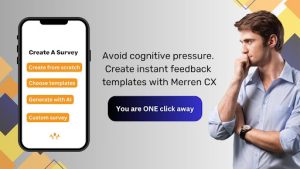Short surveys are a great way to capture superfast feedback from your target audience. However, traditional long-form surveys can be daunting. It often leads to lower response rates. This is where short surveys come in. In this blog, we’ll explore their benefits, and how they can be leveraged to enhance customer experience.
What Are Short Surveys?
Short surveys are concise questionnaires designed to gather specific information quickly. Unlike lengthy questionnaires (long surveys), short surveys typically consist of a few questions. Customer satisfaction metrics of Net Promoter Score (NPS), Customer Effort Score (CES) or Customer Satisfaction Score (CSAT) surveys are a common example of a short survey. These metrics are goal oriented and are designed to capture responses without taking up too much of the respondent’s time.
Characteristics of short surveys:
- Brevity: These surveys are designed to be completed in less than a minute.
- Focused questions: Each question is targeted and relevant to the survey’s objective.
- High engagement: The compact nature encourages higher participation rates.
- Flexibility: Can be used across various platforms, including dynamic email surveys, WhatsApp surveys and Facebook messenger surveys.
What are the Benefits of Short Surveys?
Short surveys offer numerous advantages, particularly for customer experience professionals. Here are some of the key benefits:
1. Higher response rates
Shorter surveys have the ability to achieve higher response rates. Respondents are more likely to complete a survey if they know it will only take a few minutes. This is crucial for gathering a large volume of data and preventing dropout rates.
2. Improved data quality
These customer surveys tend to yield higher quality data. When respondents aren’t overwhelmed by lengthy questionnaires, they are more likely to provide thoughtful and accurate answers. This brings more actionable insights and real-time responses.
3. Increased customer engagement
Respect your customers’ time by making it easy for them to provide experience-related feedback. This brings a high engagement rate across various critical touchpoints.

4. Faster insights
Get quicker data collection and analysis. This is particularly beneficial in fast-paced industries where timely insights are crucial. For example, if an ecommerce website launches a new product, a short survey can quickly gauge customer reactions during the initial releases.
5. Platform compatible
It is compatible across various survey distribution channels. Channels of WhatsApp messenger and Facebook messenger can offer a high response rate. While phone devices are easier to access, people can access these surveys on the move.
6. Cost-effective
Due to their brevity, they are generally more cost-effective to design and distribute. This is especially advantageous for small businesses, MSME or startups with limited budgets. The reduced cost does not compromise the quality of the data collected. Merren’s short surveys make this an efficient investment.
7. Enhanced customer experience
Businesses can stay attuned to customer needs and preferences by getting feedback at critical touchpoints.. This proactive approach helps in identifying pain points and opportunities for improvement. You can close the customer feedback loop on unhappy customers.
Best Practices for Creating Effective Short Surveys
To maximize the benefits, follow best practices in their design and implementation. Here are some tips for creating effective short surveys:
1. Define clear objectives
What specific information are you seeking? Understanding your goals will help in formulating relevant and targeted questions.
2. Keep it simple
Simplicity is key to create responsive pulse surveys. Avoid using complex language or jargon that might confuse respondents. The questions should be straightforward and easy to understand.
3. Focus on key areas
Concentrate on the most important areas relevant to your objectives. This ensures that each question provides valuable insights without overburdening the respondent.
4. Use closed-ended questions
Closed-ended questions, such as multiple-choice or rating scales, are more efficient in short surveys. They are quicker to answer and easier to analyze compared to open-ended questions.
5. Limit the number of questions
As a rule of thumb, aim for two to five questions. This keeps the survey questions to a minimum and manageable. This increases the likelihood of completion.
6. Test the survey
Before distributing the survey, test it with a small group to identify any potential issues. This can help in refining the questions and ensuring a smooth experience for respondents.
7. Provide a survey reward
Offering a small incentive, such as a discount or entry into a prize draw, can boost response rates. It shows appreciation for the respondent’s time and effort.
8. Ensure mobile compatibility
With the increasing use of mobile devices, it’s important to ensure that your survey is mobile-friendly. A responsive design will provide a seamless experience for respondents on any device.
Touchpoints for Short Surveys
Short surveys can be utilized in various touchpoints to gather valuable customer insights. Here are a few examples:
1. Post-purchase feedback
After a customer makes a purchase, a short survey can be used to gather feedback on their shopping experience.
2. Customer satisfaction
Customer satisfaction metrics through short surveys can provide ongoing insights. This includes Net Promoter Score (NPS survey), CES and CSAT surveys. It consists of one single question- quantitative metric for numeric response and a qualitative question so that people can express experiences in their own words.
3. Event feedback
If your business hosts events, a short survey can capture attendees’ feedback. It can capture the overall experience of the event. This information is valuable for planning future events.
4. Website usability
Short surveys can be embedded on your website to gather feedback on usability and navigation. This can help in identifying any pain points and enhancing the user experience.
Conclusion
Short surveys are a powerful tool for customer experience professionals. Their brevity and focus lead to higher response rates, improved data quality, and increased customer engagement. By following best practices in their design and implementation, businesses can leverage short surveys to gain timely and actionable insights. It is an efficient and effective way to achieve this, ensuring that your business remains responsive and customer-centric. Sign up for a 14 day free trial with Merren and 10X your response rate.


